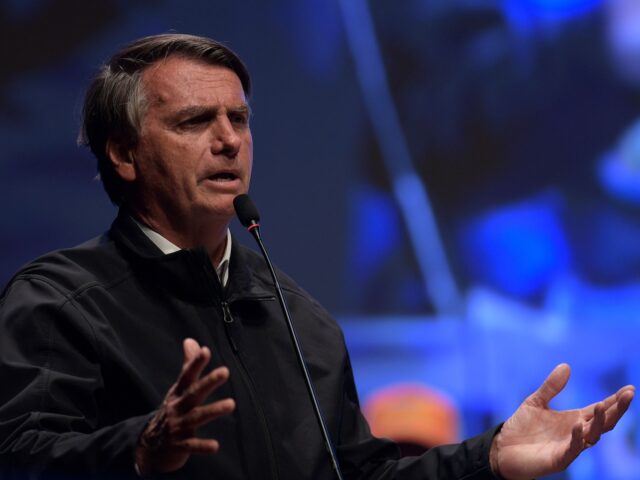The conservative administration in power in Brazil joined far-left Argentina and Mexico in declining to sign a statement against the Russian invasion of Ukraine at the Organization of American States (OAS) on Thursday.
The OAS is currently holding its national summit in Lima, Peru; most countries are being represented at the ministerial level, including America, which sent Secretary of State Antony Blinken to participate.
While the summit is largely meant to address issues pertaining to the Western Hemisphere, Blinken has pressured the platform to address the war in Ukraine.
Ukrainian President Volodymyr Zelensky, who has struggled to receive any attention in Latin America, addressed the summit when it opened on Wednesday.
Remarks by @Ukraine President Volodymyr Zelenskyy @ZelenskyyUa at Dialogue of the Heads of Delegation with #OASobservers at #OASassembly pic.twitter.com/Zuv9UVbcVn
— OAS (@OAS_official) October 5, 2022
Ukraine has few allies in the region with the notable exceptions of America, Canada, and Guatemala, which presented the official statement on the war on Thursday. Conservative Guatemalan President Alejandro Giammattei became the first regional leader to visit Kyiv in July, noting that Russian leader Vladimir Putin is one of the world’s top enablers of communist regimes in Latin America, most prominently Cuba and Venezuela. As a result, conservative leaders in the region have opposed Russia’s attempts to colonize Ukraine and expressed solidarity with Zelensky.
Conservative Brazilian President Jair Bolsonaro has notably departed from conservative opposition to Russian belligerence, typically tied to concerns about the neighboring communist threat in Cuba and Venezuela. Bolsonaro has declared Brazil officially neutral in the Ukraine war and maintained open communication with Zelensky, but opposes sanctions on Russia and recently inked a major trade agreement to buy diesel fuel from Moscow.
The OAS declaration on Ukraine published Thursday was signed by 24 member countries, led by Guatemala. The signatories expressed in the document “immense concern for the indifference and disregard on the part of the Russian Federation for the OAS exhortations for the extraction of military forces from Ukraine within its internationally recognized borders.” The latter is a way of emphasizing that signatories do not recognize Putin’s claims to Ukrainian Crimea, which Russia illegally colonized in 2014, as well as the “annexation” of four Ukrainian territories – Donetsk, Luhansk, Kherson, and Zaporizhzhia – last week.
“We reiterate the urgency of putting an end to this invasion and seeking a peaceful exit,” the statement concluded. “We cannot tolerate the intolerable and much less tolerate war, which has so affected us all.”
The far-left governments of Mexico and Argentina were among the most prominent countries not to add their names to the statement. In contrast to Brazil – run by a leader who had previously proclaimed that Brazil had an “obligation” to fight Russian-enabled communism in Latin America – Mexico’s president, Andrés Manuel López Obrador, is a hardline socialist. President Alberto Fernández of Argentina is also a radical leftist, honoring communist mass murderer Mao Zedong during a visit to Beijing in February.

Brazilian President and re-election candidate Jair Bolsonaro smiles as he drives a truck to film an electoral TV advertisement in Brasilia, on October 8, 2022.(EVARISTO SA/AFP via Getty Images)
Bolsonaro has vocally opposed sanctions on the Russian government but has stopped short of being openly antagonistic to Ukraine, as far-left presidential contender Luiz Inácio Lula da Silva, who will face Bolsonaro in the October 30 presidential election, has done. In an interview in May, Lula mocked Zelensky as a “nice comedian” who was “as responsible for as Putin for the war,” despite being elected president five years into the Russian invasion of Ukraine.
In contrast, Bolsonaro has expressed a willingness to speak to Zelensky and address his concerns as much as necessary.
“He was the one who sought to talk to us. And I said right away that I would talk to him, yes. He has a big country to run. Everything that was agreed with [Russian] President Putin is being fulfilled. On my part and on his part. I will talk to him a lot. He is a leader and I will give my opinion to him,” Bolsonaro said in July. At the time, the Brazilian president claimed that he had “the solution to this,” meaning the war, and that he would share his wisdom with Zelensky that month. Bolsonaro’s input has not ended the Russian invasion at press time.
Bolsonaro also urged an end to the war during his remarks to the United Nations General Assembly in September.
“We defend an immediate ceasefire, the protection of civilians and noncombatants, the preservation of critical infrastructure to assist the population and the maintenance of all channels of dialogue between the parties in conflict. These are the first steps towards achieving a solution that is long-lasting and sustainable,” Bolsonaro said.
The president nonetheless opposed sanctions on Russia and “economic isolation” generally, claiming that “selective sanctions … threatened human rights of vulnerable populations.”
Brazil’s choice not to participate in the OAS statement occurred on the same day that its delegation at the United Nations Human Rights Council chose to abstain from a vote to discuss the ongoing genocide of Uyghurs and other Turkic people by China. The Chinese Communist Party has been engaging in the mass imprisonment, killing, torture, rape, enslavement, and forced sterilization of Uyghurs in occupied East Turkistan since at least 2017.
While Bolsonaro had vowed to fight communism, and contain Chinese influence in Brazil, as a candidate, Brazil remained silent on Thursday, allowing the vote to simply discuss the genocide – not necessarily condemn it – fail. China, the party committing the genocide, also holds a seat on the Human Rights Council and voted against the discussion.
Like Brazil, Zelensky’s Ukraine – an eager Chinese ally – abstained from the Uyghur genocide vote. The vote to discuss the genocide lost 17-19, so Ukraine and Brazil could have together forced a tie and revote.
Follow Frances Martel on Facebook and Twitter.

COMMENTS
Please let us know if you're having issues with commenting.